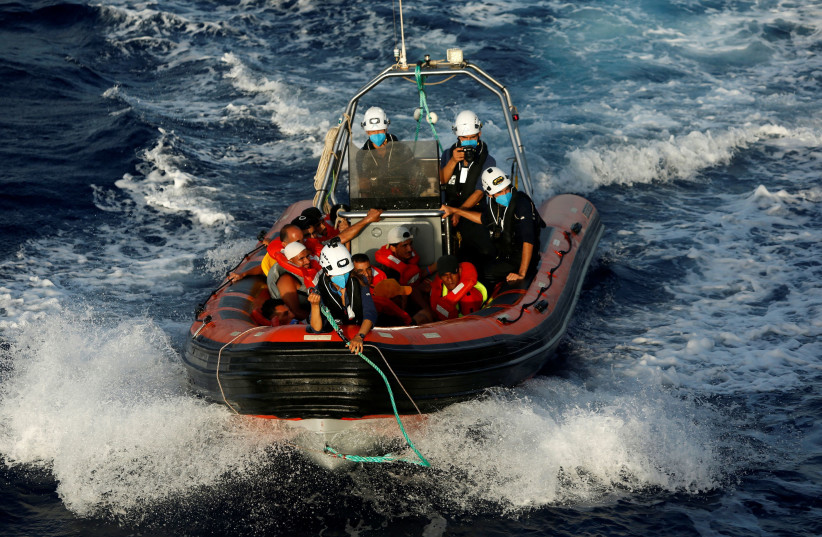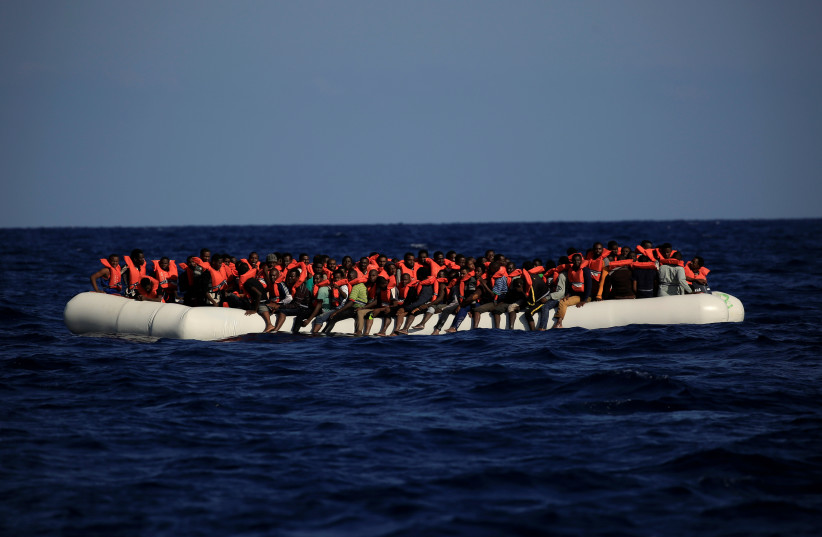Hundreds of people are missing and presumed dead after a boat travelling from Libya to Europe foundered in the Mediterranean. The unprecedented disaster in the Mediterranean off the coast of Greece and Italy shows the need for greater coordination by countries.
Different accounts have provided confusing details on precisely what happened, but what is clear is that a boat was overloaded by hundreds more people than should have been aboard. Most of these people were migrants seeking to get to Italy.
CNN says “the boat was traveling from the coastal city of Tobruk in Libya to Italy when it capsized off the coast of Greece. At least 78 people have died and some reports said up to 750 were on board.” A father from Pakistan told the BBC that his son is missing and that his son was “brainwashed” by smugglers to make the “dangerous voyage from Libya to Europe.
“The fate of Shahid Mehmood's son is currently unknown, but the family back in Mandrah are worried for him after learning that the body of a man he was travelling with has been found. The UN human rights office says that up to 500 people are missing from the capsized fishing boat and that dozens of people are known to have died.”
According to another BBC account it is believed that many women and children were on the boat, trapped below when it sank. The Greek coastguard had approached the boat, according to reports. “A few hours before the boat went down the coastguard had ‘used a rope to steady themselves, to approach, to see if they wanted any help.’ But he stressed: ‘There was no mooring rope.’…’They refused it, they said, 'no help, we go to Italy' and continued on their way.’”

What actually happened on June 14 that led to this disaster is partly in dispute. However, key details have been published by the Greek coastguard. “It claims Frontex, the European Border and coastguard, alerted it to the ship’s whereabouts on Tuesday morning, and it dispatched two helicopters, a high seas patrol vessel from the city of Chania and a Maltese-flagged rescue ship, all of which made visual contact with the trawler at various times,” Al-Jazeera noted.
A ship, full of helpless migrants
The ship full of helpless migrants overpacked by the smugglers had communications with the outside world as it travelled towards the final disaster. The boat, apparently originally fishing trawler, likely used illegally by the smugglers because it was in bad shape and perhaps ready for the scrap heap, made contact with the Greek coast guard in the afternoon. “The trawler didn’t ask for any help from the coastguard or from Greece.”
The boat was dozens off miles off shore when its engine stopped working and it capsized around 47 nautical miles off the coast. International waters begin 24 miles off the coast, it’s important to note that vessels on the high seas are not under a country’s laws, so Greece had no right to interfere with the boat if the skipper on board claimed, wrongly, that the ship was safe and not in distress.
It’s important to stress this point, because there are rules and traditions that govern seafaring and are designed to help vessels in distress. However if a the crew is negligent or criminal then the passengers may become victims.
According to the reports a “Maltese ship did pull up alongside the trawler at 6pm (15:00 GMT) to deposit food and water.” When the ship did capsized dozens of men were pulled from the water. “All the survivors were male, aid workers told Al Jazeera, and many collapsed on the dock as soon as they arrived on Wednesday [June 14]. Many were in a state of shock,” Al-Jazeera notes. If it is true that many women and children were on the boat, it appears they were forcibly kept below and that they died due to the rapidity of the boat foundering.

While the Greek coast guard monitored the ship and followed it, the captain on the ship refused assistance, the reports say. Another report says that an NGO that supports migrants received a call from people on the boat. Those people claimed they would not survive the journey.
However, Al-Jazeera notes that the NGO “said the reason passengers on the trawler turned away Greece’s assistance is that ‘people on the move know that thousands have been shot at, beaten, and abandoned at sea by these Greek forces.’”
This creates a troubling picture. The people on board had been lied to and told not to accept assistance from the Greek coast guard. The captain and crew apparently refused aid and did not broadcast or make any kind of distress call. It’s unclear if the Greek coastguard had a legal mandate to intervene, it doesn’t appear they did.
This shows how the wide swath of water between North Africa and Europe has continued to be a no-mans-land in terms of the horrors of the smuggling trade that has killed thousands of migrants. It’s important to note here that regardless of whether one supports migrants reaching Europe or not, the overall picture is one of chaos in which no one wants to take responsible for the trade in human lives.
Migrants are often lured from the coast of Africa to the Mediterranean, where they are told that phone calls to NGOs will result in rescue and then after being rescued they will be taken to Europe for a new life. All they have to do is cram aboard vessels that are not seaworthy and float into international waters. The NGOs that aid the migrants and may give false hope, then accuse the countries of “pushbacks” of the migrants.
The smuggling operations that acquire the boats and illegally cram them with people, beyond the legal carrying capacity, often are able to escape. In some cases the smugglers will call in the position of a vessel they have abandoned, and tell NGOs or coast guards to come help.
The rules of the sea are such that boats in distress, where this is risk of life, should be assisted by any boats in the vicinity provided those boats are not also in danger. However, what has become clear is that the current system enables chaos and death. On the other hand unstable states like Libya fuel the crisis because no authorities control the ports enough to prevent the migration.
This instability is important because it shows how the Mediterranean needs more coordination between states and an investment in the systems and infrastructure that can help prevent more disasters at sea. This means addressing the chaos in Libya, as well as better coordination between rescue vessels and those able to provide assistance.
